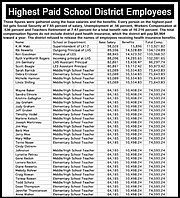Three educators rise to top of payroll
Three Libby school district employees make more than six figures in total compensation, with another poised to clear that benchmark next school year as 14 teachers and paraprofessionals remain on the chopping block because of budget shortfalls.
The three currently exceeding $100,000 after benefits are Superintendent K.W. Maki at $113,921.82, outgoing Libby High School Principal Rik Rewerts at $104,124.89 and Libby Elementary School Principal Ron Goodman at $103,368.32. Incoming Libby High Principal Ruth Ann VanWorth-Rogers is poised to clear $102,381.65 when she takes the reins next year.
An additional two employees in administration make more than $90,000, and 37 teachers make more than $70,000 a year with all benefits tallied.
While the numbers are high, Maki said Libby’s unique position necessitates attractive compensation.
“If you have low pay, lower than all the others, who are you going to get to apply?” Maki said. “Libby is in a location where we do have to have incentives for people to come here. If we’re competing to get people to our school and not losing the good people we have to others … you can have all the beauty in the world and all of that, but you have to be able to make a living.”
The Western News compiled school district employee compensation totals after adding total salaries to the benefit schedule that includes Social Security, unemployment insurance, workers compensation and the teachers retirement program. These total up to an additional 16.216 percent on top of base salary for teachers, administration and paraprofessionals.
Maki said the salary numbers could be misleading, even for the highest paid positions.
“If you were to look at every school in the whole area, the superintendent in Libby, Montana, makes a lot less than even smaller schools, and receives a lot less benefit than a lot of other schools,” Maki said. “But being as stubborn as I am, money isn’t a factor there. If they hire somebody else, they aren’t going to get them for peanuts.”
For the most part, he’s right. Calls to similarly sized school districts revealed that Maki is slightly above average for Libby’s size, but not at the top of the pile. Dr. Kate Orozco, Whitefish’s Superintendent (with a student population of 1,600) makes $114,188 before benefits, compared to Maki’s $98,026. Similarly sized Corvallis and Hamilton give their superintendents, Monte Silk and Tom Korst, $97,365 and $95,000 respectively. Jim Mepham, Eureka’s superintendent, rakes in $102,721 including benefits, while Deer Lodge’s Rick Duncan pulls down a total compensation package of $112,164.
Some other notable salaries include Head Custodian Louis Mysse, at $47,745.36, highest paid Paraprofessional Billie Jo Jones at $27,420.22, and high school secretaries Mona Crismore, Karen Erickson and Linda Day with $32,262.11. Custodians, lunch workers, secretaries and district office employees have a benefit rate of 15.546 percent.
The compensation figures do not include district-paid health insurance. Employees can get up to $8,964 per year by electing to take the insurance. In fiscal year 2011-12, the district spent $778,675 on health insurance. For 142 employees that averages $5,483.63 per employee. The Libby School Board approved a 6.8 percent increase cost for medical insurance last month, incurring an additional cost of $53,693.
Libby schools have a total student population of 1,134, down nearly 39 percent from the 2001-02 fiscal year, the year of the last successful mill levy, when student enrollment was 1,846. In that time, total teachers declined from 121 to 88 today. That’s a decline of more than 27 percent, almost a full 12 percent discrepancy between teachers and students declining.
The student-to-teacher ratio has slipped from 15.23-1 in 2001 to 12.89-1 today. That figure does not take into account larger classes in comparison to small, just the total number of students divided by employees. Some class sizes in the elementary school reach as high as 25 students per teacher.
The number of teachers in the district, while declining, has not kept pace with the declining enrollment.
But it is evidently working. The district has the highest graduation rate in the state and the teachers in Libby have a high retention rate. Of the 88 teachers on the current payroll, 43 are on the 15th or 16th step in the “steps and lanes” advancement schedule.
The steps and lanes increase was just approved by the Libby School Board in lieu of a pay raise for the next fiscal year. This will cost the district an estimated $120,000. The district approved a 1 percent raise last year, but Maki said the district has no plans to increase salaries beyond steps and lanes next year.
With the attractive salaries, the high retention rate isn’t necessarily a surprise. The average teacher salary before benefits in the Libby School District is $53,033. The average teacher salary in Montana, according to official documents from National Education Association, was $48,546 in the 2011-12 school year. That means the average teacher in Libby, after the 16.216 percent benefit scale, makes $61,632.83, not including health insurance. This compares to the statewide average teacher compensation of $56,418.22.
Nearly 84 percent of Libby School District’s operating budget goes directly to payroll. With tenured teachers, pensions and state-mandated salaries, the district is locked into that amount.
Cuts have to come from somewhere, so non-tenured educators and programs are in the line of fire.
“We’ve already cut $55,000 from activities,” Maki said.
The 14 employees that had non-renewed contracts had a total compensation package of $490,252.52, an average of $35,018.04 per employee.
With retiring highly paid teachers, some of those 14 educators and paraprofessionals are guaranteed to return. How many remains to be seen.



